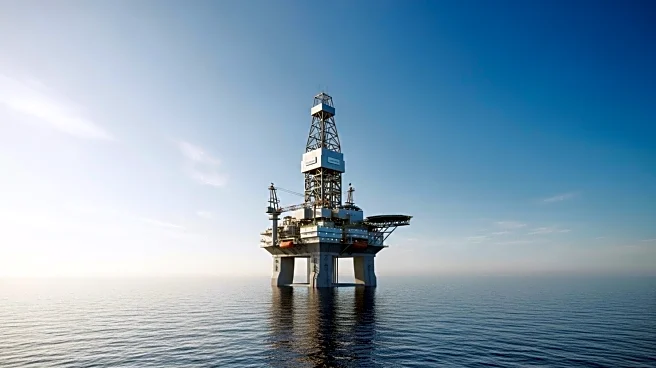What's Happening?
Shell Plc is set to resume preliminary work on the Dragon offshore gas field in Venezuela, aiming to supply gas to Trinidad and Tobago. This development follows expectations that the Trump administration will issue a new license exempting the project from existing sanctions. The Dragon gas field, located in shallow waters between Venezuela and Trinidad, is crucial for replenishing feedstock for Trinidad's liquefaction complex and petrochemical plants. Trinidad is a significant exporter of LNG, ammonia, and other gas-based products. The U.S. administration had previously revoked oil and gas licenses in Venezuela to increase pressure on the country, which it views as a haven for drug cartels. However, recent moves suggest a shift, with a restricted license already issued to Chevron Corp. for Venezuelan oil production and exports.
Why It's Important?
The resumption of the Dragon gas project is significant for several reasons. It highlights a potential shift in U.S. policy towards Venezuela, balancing geopolitical strategies with economic interests. For Trinidad and Tobago, the project is vital to address declining gas production, which has impacted its exports of LNG and petrochemicals. The U.S. administration's decision to allow oil companies to operate in Venezuela without paying taxes and royalties in hard currency could facilitate long-term investments in the region. This move could also stabilize Trinidad's economy, which relies heavily on its energy sector, and support U.S. farmers who depend on ammonia imports from Trinidad.
What's Next?
The final terms of Shell's license are still under discussion, with the company seeking a duration of up to 10 years to facilitate long-term investment. In parallel, bp Plc is also seeking to restore its license for the Manakin-Cocuina gas field, which straddles the maritime border between Venezuela and Trinidad. The U.S. administration's approach will likely continue to balance economic interests with geopolitical considerations, ensuring that any benefits to the Maduro regime are minimized. The outcome of these negotiations will be closely watched by stakeholders in the energy sector and could set a precedent for future U.S. policy towards Venezuela.
Beyond the Headlines
The decision to ease restrictions on Venezuelan gas projects could have broader implications for U.S.-Venezuela relations and the global energy market. It may signal a willingness to engage with Venezuela under specific conditions, potentially opening the door for further diplomatic negotiations. Additionally, the move could influence other countries' policies towards Venezuela, particularly those in the region that are affected by its economic and political instability. The long-term impact on the global energy market will depend on the scale and success of these projects, as well as the evolving geopolitical landscape.









